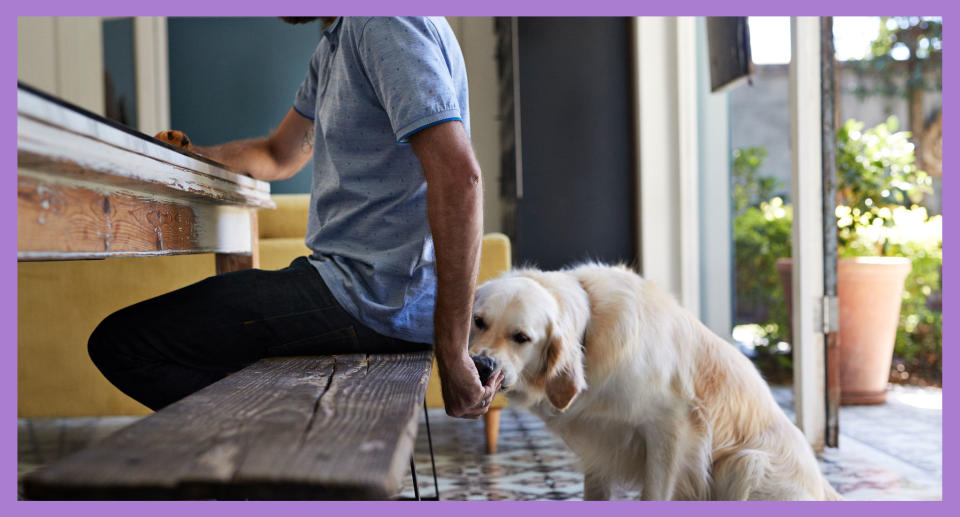Vets wants you to stop giving your dog people food and table scraps — here's why
As most people with dogs (and some people with cats) know, pets begging under the table for scraps of breakfast, lunch, dinner and snacks can be a very real thing. And if you love your animal, the temptation to give in to their pleas – those cries that sound like they’re actually starving right in front of you – is strong. Whether it’s meowing, barking or just plain staring, it’s a real thing, and it’s hard to resist.
However, expert veterinarians want you to know you’re putting your pets long-term health at risk when you give them people food and table scraps.
It’s the calories and fat
While a small bite of burger can seem like a small amount of food for an adult human, when you compare our size to most animals, it can be a huge amount of their daily caloric intake.
“People don't understand that they're feeding them their normal rations, they're getting as many calories as they need. And then they give him a little piece of ground beef or something like that, not realizing that that's basically one seventh of their daily calorie intake in that one bite of food,” explains Mark Verdino, DVM, vice president and chief veterinary staff of North Shore Animal League America. “And you do a couple of those, then your multiple family members are doing it, it adds up. You can end up with animals that are significantly overweight or obese.”
Not to mention, table scraps do not have the proper nutritional balance for your pets diet.
“People food is definitely much higher in fat and salt content. So in general, animals are not going to be able to digest those, that increased amounts of fat as well as we are,” says Hyunmin Kim, DVM, veterinary staff manager, Community Medicine of the American Society for the Prevention of Cruelty to Animals.
Some table foods are toxic for your pets

Beyond not having the proper nutrients for your companion animals, some people food can actually be quite harmful.
“There are people foods that are toxic. And when I say toxic, some of them are very severe, like grapes and raisins can have a very severe toxicity, can cause kidney failure, which can be life-threatening,” explains Dr. Verdino. “And it's unfortunately very variable on how dogs in particular are affected by it. Some dogs can eat up a bunch of raisins and have no problems. Other dogs eat one raisin and they die.”
And while all people food might not be life-threatening, it’s not always going to agree with digestive systems in animals.
“Many of the other toxicities tend to be gastrointestinal in nature. They can cause an upset stomach, vomiting, diarrhea, that type of stuff. But just be careful with it.”
Foods to avoid specifically include avocados, chocolate and more.
The long-term risks of obesity
While chubby animals are cute, a diet of table scraps (or just some table food) can lead to obesity, which is as much of a health crisis for animals as it is for humans. Both cats and dogs can suffer myriad health problems from being overweight, which can lead to illness, pain, discomfort, and potentially, an early death.
“With dogs I would say the main thing is kind of stress on their various organ systems and also on their joints, especially that added weight is definitely going to, as they get older, increase pressure on the joints, lead to worse arthritis than your average lean animal,” said Dr. Kim, “And it can also cause other heart problems as well because even though they don't get a chronic disease like people do, they still can have that fatty build-up in their blood vessels.”
“Overweight cats, their number one problem is diabetes, and also the pressure on their joints,” explained Dr. Kim, “So overweight cats, they're going to have more arthritis than their lean counterparts and they're also unable to groom. They can even get skin infections from not being able to clean themselves.”
What’s the solution?
The experts we spoke with both agreed that people or table food, as long as it is not toxic, can be fine for a very rare treat. However, if you’ve been feeding your pet table scraps and they are overweight, it’s best to steer the animal toward an appropriate diet as soon as possible. While you should consult your own vet, there are some simple steps you can take on your own.
“The easiest way for people to start is if they have a brand of food that they regularly feed their animals, they can look up the recommended feeding on the back or on the can,” said Dr. Kim.
Following those guidelines, and cutting out the table food should get your pet back on the right track. If you’re not seeing any changes in weight, take your pet to the vet for further evaluation.

